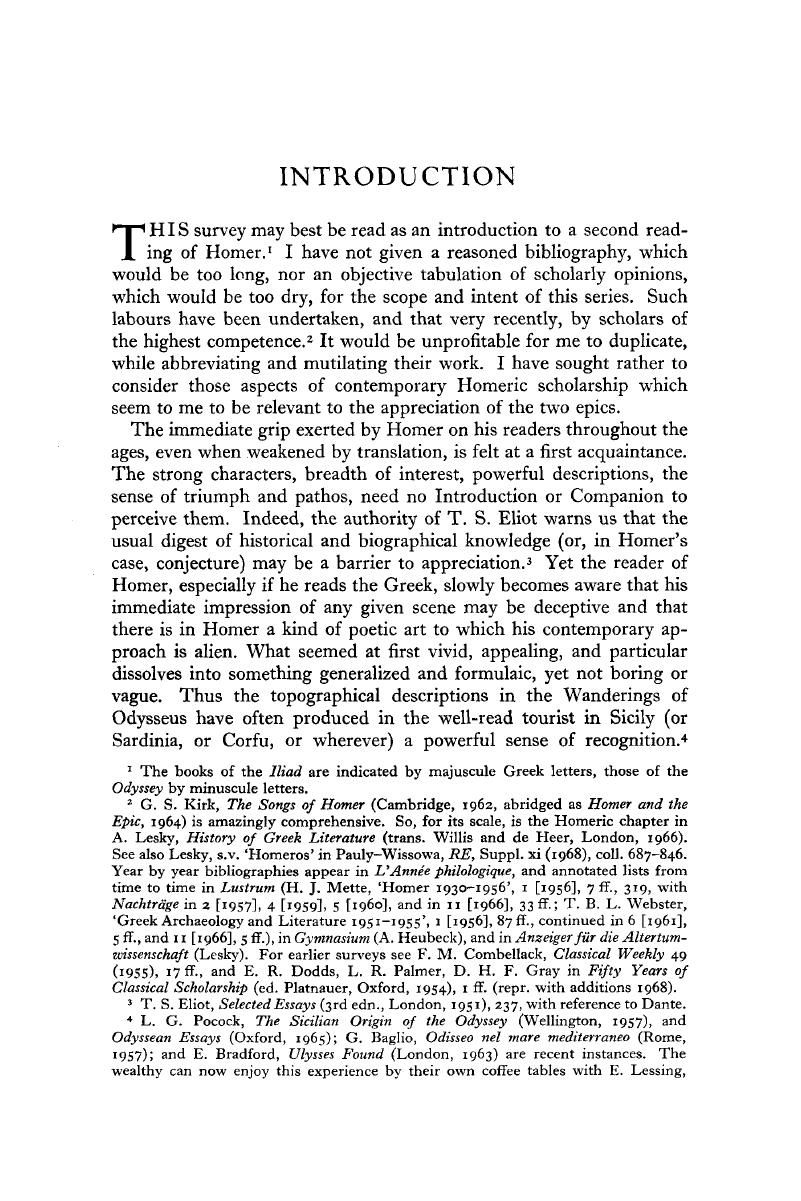No CrossRef data available.
Article contents
Introduction
Published online by Cambridge University Press: 05 February 2016
Abstract

- Type
- Introduction
- Information
- Copyright
- Copyright © The Classical Association 1969
References
page no 1 note 1 The books of the Iliad are indicated by majuscule Greek letters, those of the Odyssey by minuscule letters.
page no 1 note 2 Kirk, G.S., The Songs of Homer (Cambridge, 1962 Google Scholar, abridged as Homer and the Epic, 1964) is amazingly comprehensive. So, for its scale, is the Homeric chapter in Lesky, A., History of Greek Literature (trans. Willis and de Heer, London, 1966)Google Scholar. See also Lesky, , s.v. ‘Homeros’ in Pauly-Wissowa, RE, Suppl. xi (1968)Google Scholar, coll. 687-846. Year by year bibliographies appear in L’Année philologique, and annotated lists from time to time in Lustrum ( Mette, H.J., ‘Homer 1930-1956’, 1 [1956], 7 Google Scholar ff., 319, with Nachträge in 2 [1957], 4 [1959], 5 [1960], and in 11 [1966], 33 ff.; Webster, T.B.L., ‘Greek Archaeology and Literature 1951-1955’, 1 [1956], 87 Google Scholar ff., continued in 6 [1961], 5 ff., and 11 [1966], 5 ff.), in Gymnasium (A. Heubeck), and in Anzeiger für die Altertum wissenschaft (Lesky). For earlier surveys see Combellack, F.M., Classical Weekly 49 (1955), 17 CrossRefGoogle Scholar ff., and Dodds, E.R., Palmer, L.R., Gray, D.H.F. in Fifty Years of Classical Scholarship (ed. Platnauer, , Oxford, 1954), 1 ffGoogle Scholar. (repr. with additions 1968).
page no 1 note 3 Eliot, T.S., Selected Essays (3rd edn., London, 1951), 237 Google Scholar, with reference to Dante.
page no 1 note 4 Pocock, L.G., The Sicilian Origin of the Odyssey (Wellington, 1957)Google Scholar, and Odyssean Essays (Oxford, 1965); Baglio, G., Odisseo nel mare mediterraneo (Rome, 1957)Google Scholar; and Bradford, E., Ulysses Found (London, 1963)Google Scholar are recent instances. The wealthy can now enjoy this experience by their own coffee tables with Lessing, E., The voyages of Ulysses: a photographic interpretation of Homer’s classic (London, 1966)Google Scholar. For a more methodical study see Moulinier, L., Quelques hypothèses relatives à la géographie d’Homère dans l’Odyssée (Paris, 1959)Google Scholar. The directly opposite view, that the Wanderings are an allegory of the Plight of Man, advanced by Lord, G. de F., Homeric Renaissance (New Haven. 1956)Google Scholar is equally untenable.
page no 2 note 1 For the general point see Combellack, , ‘Milman Parry and Homeric Artistry’, Comparative Literature 11 (1959), 193–208 CrossRefGoogle Scholar.
page no 2 note 2 In addition to Kirk, Songs English readers have the Companion to Homer (edd. Wace, and Stubbings, , London, 1962)Google Scholar. Vermeule, E.T., Greece in the Bronze Age (Chicago, 1965)Google Scholar deals admirably with the pure archaeology. Lorimer, H.L., Homer and the Monuments (London, 1950)Google Scholar remains the most convenient survey of its subject: even more comprehensive, when completed, will be Archaeologia Homerica (edd. Matz, and Buchholz, , Göttingen, 1967- ).Google Scholar Finley, M.I., The World of Odysseus (London, 1956 Google Scholar) remains useful on socio-economic matters. Myres, J.L., Homer and his Critics (edited and continued by Gray, D.H.F., London, 1958 Google Scholar) contains much of interest on the history of the Problem; cf. Gomme, A.W., ‘Homer and Recent Criticism’, in More Essays in Greek History and Literature (Oxford, 1962 Google Scholar), and the surveys of Combellack and Dodds.
page no 3 note 1 Beye, C. R. has said many useful things in his popular study, The Iliad, the Odyssey, and the Epic Tradition (London, 1968)Google Scholar.


